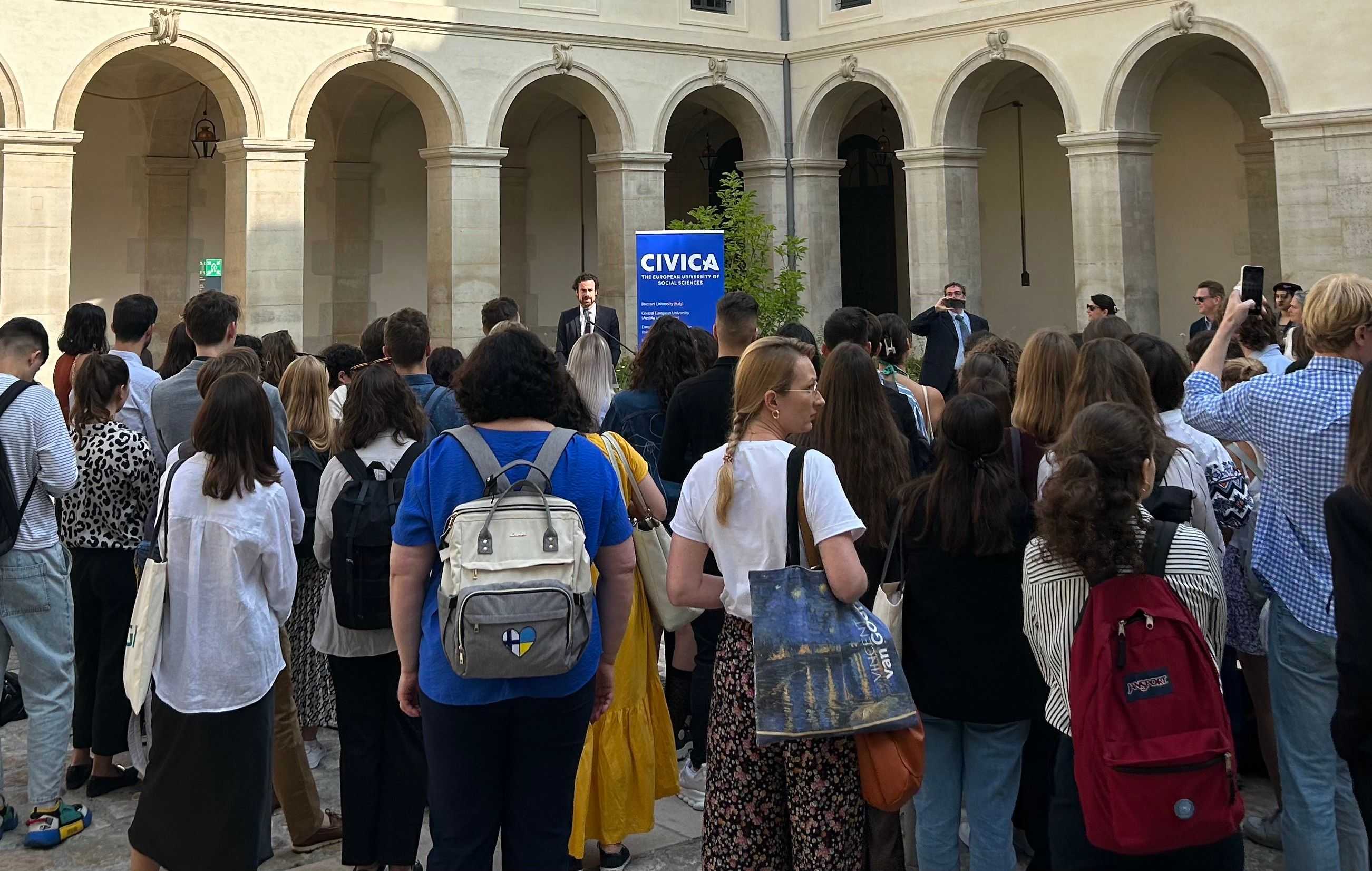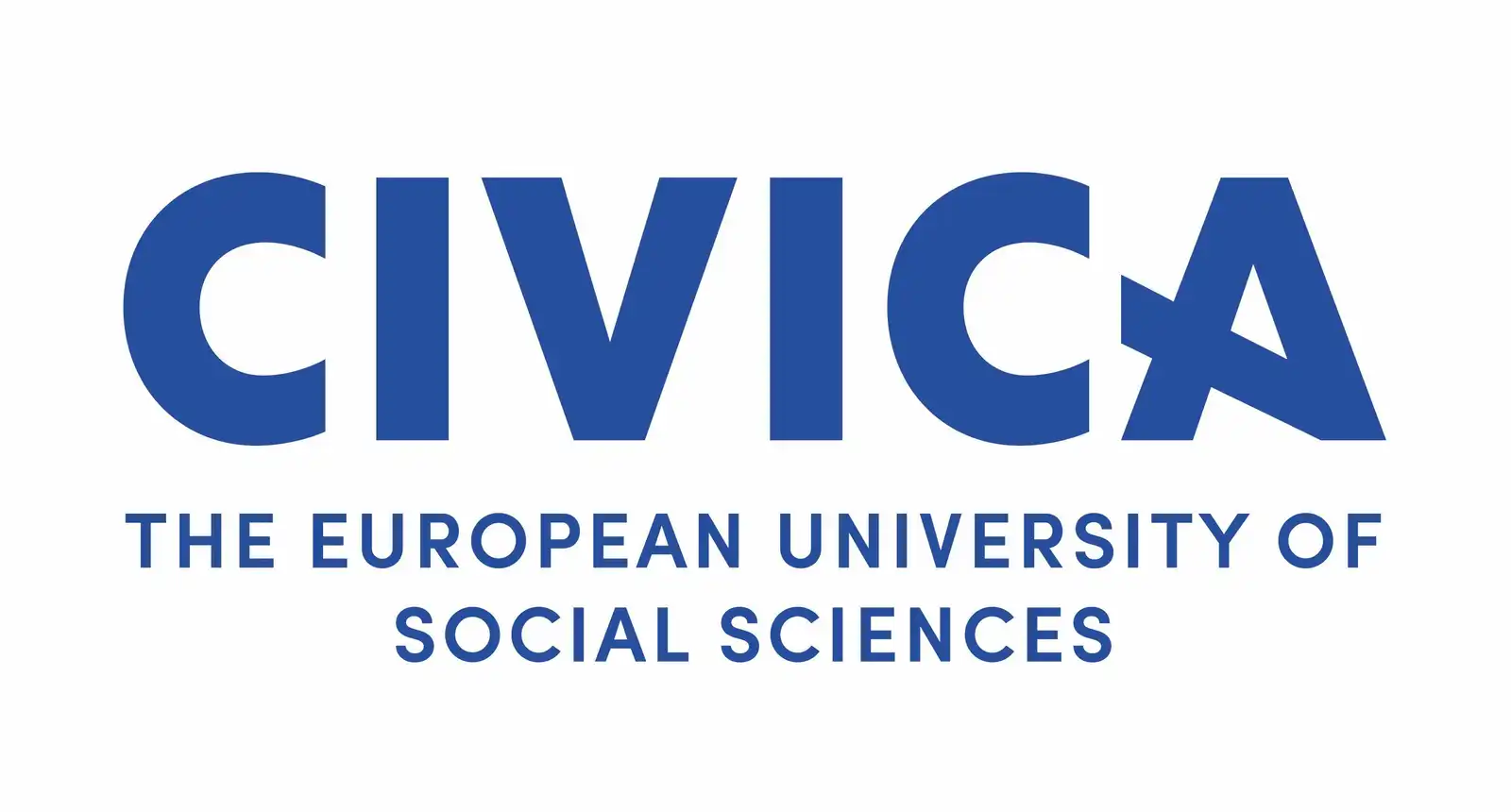Home>Sport and social impact: 3 Students Discuss Their CIVICA Engage Track Journey

28.07.2023
Sport and social impact: 3 Students Discuss Their CIVICA Engage Track Journey
Every bachelor student at Sciences Po's Undergraduate College can enroll in the CIVICA Engage Track, a European multi-campus, interdisciplinary bachelor experience with a focus on civic engagement. This is one of the many opportunities that are offered to our students, professors and researchers thanks to Sciences Po being a founding member of CIVICA, the European university of Social Sciences.
In order to complete the CIVICA Engage Track and receive a CIVICA Engage formal acknowledgement, students must: meet the obligations of the Sciences Po Civic Learning Programme, successfully complete an Engage Course at a CIVICA Partner University or participate in a European Week and complete a Showcase Reflective Component (graded by Sciences Po on a pass/fail basis).
We met three students who followed this specific track during the three years of their bachelor's degree - Lidia Bilali, Noémie Dott and Paula Druschke - to know more about their experience and what they learned from this particular focus on European civic engagement, especially through the European Week 2022 focused on “Sport and social impact”.
who are you and what has been your journey at sciences po?
LIDIA: My name is Lidia, I am originally from Italy and have just finished my bachelor’s degree at Sciences Po. I have spent the first two years on the Paris campus and my year abroad at Yale-NUS College in Singapore. So far, my experience at Sciences Po has been very enriching from several points of view: academically but also in terms of student associations and deep friendships. I am grateful to Sciences Po for always fostering critical thinking among its students, and for allowing us to explore new parts of the world.
NOÉMIE: My name is Noémie, I am a French national that grew up in Spain and the United States. I was a student of the dual degree between Sciences Po and University College London, where I studied International Relations. Before that, I studied two years on the Poitiers campus, where I loved taking an active part in the student life.
PAULA: My name is Paula and I'm German. I studied on the Nancy campus, the “most European Campus” of Sciences Po. I proceeded to choose “Economy and Society” as a major and went abroad to study at the National University of Singapore in my third year. Even though I started learning French only a few years before I started my studies at Sciences Po, I had no struggles integrating into this new environment, which soon became a second home away from home.
Looking back, I can say that going to Sciences Po was one of the best things that could have happened to me. I met people that fiercely challenged my worldviews, learned how to form and express my opinion, I picked up new languages, and lived in foreign countries.
How was your experience through the CIVICA Engage Track?
LIDIA: My experience with the CIVICA Engage Track is to be understood within the Civic Learning Programme that is accomplished throughout the bachelor at Sciences Po: all students are asked to conclude a month-long internship during the first year, then a year-long commitment during the second. In my case, I spent, first, a month in a Parisian high school providing help and support to 12th graders in the preparation of their Baccalauréat. Then, during the second year I engaged in a non-governmental organisation that provides free tickets to cultural and sporting events to underprivileged people in Paris.
I also took part in the CIVICA European Week 2022 on the topic of “Sport and social impact” in Milan. It was a special opportunity to connect with fellow students, professors and other professionals in order to understand the world of sports and its potentialities for what concerns education and social inclusion.
NOÉMIE: I’ve always been involved in sports whether it was in practicing them or organising them, therefore the “Sport and social impact” theme of the CIVICA European Week 2022 really interested me. Overall, the CIVICA Engage Track gave me an opportunity to dig a little deeper into my civic engament topic that was “women’s access to soccer”. The European Week allowed me to gain hands-on experience and understand how sports can be a very resourceful tool socially but also economically and politically. The programme was a rich learning experience shared with students from across Europe that reunited theory with practice.
PAULA: The CIVICA European Week 2022 presented me with the unique opportunity to combine my passion for social sciences with my love for sports. Having played competitive football since I was seven years old, and dreamed of pursuing a career in the political sphere since a young age, I always felt like standing between two worlds, which I found hard to combine. The European Week gave me a perspective into how a fusion of these two passions might be possible in a professional context.
Can you tell us about your final showcase assignment?
LIDIA: For my Showcase Assignment, I have decided to produce a video with an analysis of both my personal experience (including the acquisition of new knowledge and skills) and of an issue encountered during the European Week 2022. I have decided to address the topic of “Disability and Sports”, with the aim of offering a deeper reflection on the theme.
This topic was inspired by one meeting we had at Bocconi University with Alessio Tavecchio, the founder of the homonymous Onlus Foundation, which promotes inclusiveness for people with disabilities through sports. After talking to him and getting to know his personal story as a paralympic athlete, we also had the opportunity to play in Bocconi’s Team Sport Arena while simulating the playing conditions of athletes with physical disabilities - for example by playing basketball on wheelchairs. I adopted in my work a top-down approach - therefore considering the role of institutions such as governments, the United Nations and sports committees; then a bottom-up one - rather focusing on the activist identities of athletes with disabilities.
NOÉMIE: My showcase assignment was in the format of a podcast where I first described the European Week in Milan and then analysed the link between sports and education. I demonstrated through multiple examples like Inter Campus, that sports can be a very important tool for educational purposes.
Sports can be used to develop collective values and cognitive skills that are also needed in day-to-day education at school. Therefore, it is very important to develop the sport offer in educational fields but also to develop sports where education is not yet a standardised right for all children.
PAULA: In my showcase assignment, I decided to take a closer look at the gender pay gap in sports. Having played in an all-boys football team for over seven years and competing today at a professional level in this highly male-dominated sport, gender discrimination is something that I have experienced in various forms. Whether it is through direct discrimination on the pitch, the perpetuation of stereotypes, tremendous financial inequalities, or more subtle things like gendered media reports. I realised that in fact, every little girl who joyfully kicks a ball is, without even knowing it, daringly challenging the patriarchal structures.
I feel that as an aspiring social scientist, it is my responsibility to contribute to this challenge by providing watertight numbers on these inequalities and proposing viable solutions. The CIVICA European Week 2022 shed light on how many people still face barriers in accessing the world of sports, may this be due to disabilities, financial hardships, or other inequalities. The discrimination that we did not talk about was against women, even though the world of sports remains drastically male-dominated and the overrepresentation of men in the sports industry could even be felt during our learning experience in Milan. I hope I raised awareness about this issue in my final work.
Stay tuned, subscribe to the CIVICA newsletter!



